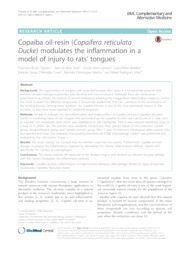Copaiba oil-resin (Copaifera reticulata Ducke) modulates the inflammation in a model of injury to rats' tongues.
Copaiba oil-resin (Copaifera reticulata Ducke) modulates the inflammation in a model of injury to rats' tongues.
Author(s): TEIXEIRA, F. B.; SILVA, R. de B.; LAMEIRA, O. A.; WEBBER, L. P.; COUTO, R. S. D.; MARTINS, M. D.; LIMA, R. R.
Summary: A method for the separation, identification and quantification of 24 phenolic compounds using ultra-high performance liquid chromatography coupled to tandem mass spectrometry (UHPLC-MS/MS) was developed and validated. Six species of traditional medicinal plants from the Brazilian Amazon region were studied (Mansoa alliacea, Bauhinia variegata var. variegata, Bauhinia variegata var. alboflava, Connarus perrottetii var. angustifolius, Cecropia obtusa and Cecropia palmata). The analytes were separated by a reversed-phase SB-C18 column (2.1 × 50 mm, 1.8 μm) using a gradient elution of 7 min composed of 0.1% acetic acid in water (v/v) and acetonitrile, at a constant flow rate of 0.8 mL min−1. The limit of detection for the analytes ranged between 0.5 and 130.3 μg L−1. Intra- and inter-day precision showed satisfactory results and the recoveries obtained for the 24 analytes varied between 91.7 and 111.9% for most of the evaluated matrices. Quantifications were performed with the standard addition method (r > 0.99) using the data acquired in a multiple reaction monitoring (MRM) mode. Rutin, apigenin, vanillic acid, caffeic acid, ferulic acid, p-coumaric acid and trans-cinnamic acid were found in all the studied plants. However, we highlight the high contents of rutin in varieties of Bauhinia variegata (up to 2.52 mg g−1 of plant), chlorogenic acid in species of genus Cecropia (up to 0.57 mg g−1 of plant) and catechin in Connarus perrottetii var. angustifolius (1.77 mg g−1 of plant).
Publication year: 2017
Types of publication: Journal article
Unit: Embrapa Eastern Amazon
Keywords: Copaifera Reticulata Ducke, Copaíba, Planta Medicinal
Observation
Some of Embrapa's publications are published as ePub files. To read them, use or download one of the following free software options to your computer or mobile device. Android: Google Play Books; IOS: iBooks; Windows and Linux: Calibre.
Access other publications
Access the Agricultural Research Database (BDPA) to consult Embrapa's full library collection and records.
Visit Embrapa Bookstore to purchase books and other publications sold by Embrapa.

